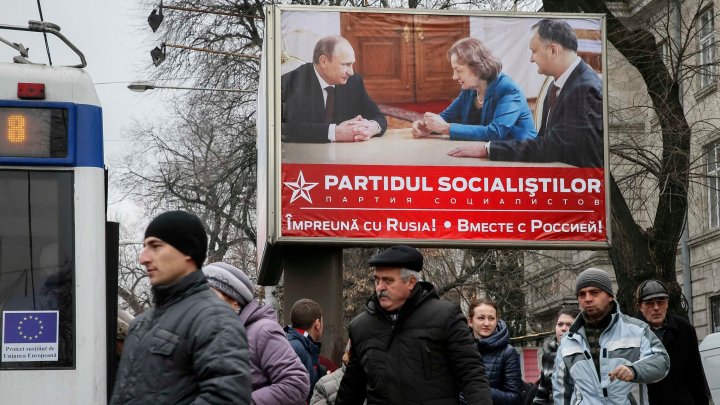New York Times: Top secret Russian Unit targeted Moldova in campaign to destabilize Europe
 foto: An election sign in Chisinau, Moldova, in 2014 showed representatives of the anti-European Socialist Party with President Vladimir V. Putin of Russia.CreditGleb Garanich/Reuters
foto: An election sign in Chisinau, Moldova, in 2014 showed representatives of the anti-European Socialist Party with President Vladimir V. Putin of Russia.CreditGleb Garanich/Reuters
A top secret Russian unit launched a series of operations including in Moldova within a campaign to destabilize Europe, according to Western security officials on The New York Times.
"First came a destabilization campaign in Moldova, followed by the poisoning of an arms dealer in Bulgaria and then a thwarted coup in Montenegro. Last year, there was an attempt to assassinate a former Russian spy in Britain using a nerve agent. Though the operations bore the fingerprints of Russia’s intelligence services, the authorities initially saw them as isolated, unconnected attacks", writes Michael Schwirtz, an investigative reporter with The New York Times based at the United Nations.
Western security officials have now concluded that these operations, and potentially many others, are part of a coordinated and ongoing campaign to destabilize Europe, executed by an elite unit inside the Russian intelligence system skilled in subversion, sabotage and assassination.
The group, known as Unit 29155, has operated for at least a decade, yet Western officials only recently discovered it. Intelligence officials in four Western countries say it is unclear how often the unit is mobilized and warn that it is impossible to know when and where its operatives will strike.
In a text message, Dmitri S. Peskov, Mr. Putin’s spokesman, directed questions about the unit to the Russian Defense Ministry. The ministry did not respond to requests for comment.
Although little is known about Unit 29155 itself, there are clues in public Russian records that suggest links to the Kremlin’s broader hybrid strategy.
A 2012 directive from the Russian Defense Ministry assigned bonuses to three units for “special achievements in military service.” One was Unit 29155. Another was Unit 74455, which was involved in the 2016 election interference. The third was Unit 99450, whose officers are believed to have been involved in the annexation of the Crimean Peninsula in 2014.
A retired G.R.U. officer with knowledge of Unit 29155 said that it specialized in preparing for “diversionary” missions, “in groups or individually — bombings, murders, anything.”
The current commander, General Averyanov, graduated in 1988 from the Tashkent Military Academy in what was then the Soviet Republic of Uzbekistan. It is likely that he would have fought in both the first and second Chechen wars, and he was awarded a Hero of Russia medal, the country’s highest honor, in January 2015. The two officers charged with the Skripal poisoning also received the same award.
The poisoning led to a geopolitical standoff, with more than 20 nations, including the United States, expelling 150 Russian diplomats in a show of solidarity with Britain.